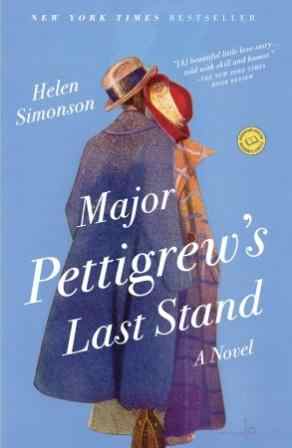 Synopsis:
Synopsis:
Major Ernest Pettigrew (Ret.) is a proper English gentleman. He lives in the village of Edgecombe St. Mary in a cottage called Rose Lodge. It has been six years since the death of his beloved wife, Nancy, and their only son, Roger, is a self-absorbed banker who seldom visits and with whom the Major has always had a strained and distant relationship. At sixty-eight-years-old, the Major enjoys his tea, garden, the company of good books, a round of golf at his local club or a vigorous hunt.
As the story opens, Major Pettigrew receives word that his younger brother, Bertie, has died suddenly. Overcome with grief, the Major’s soon concerns himself with the matter of their father’s guns, a pair of valuable Churchill hunting rifles. The Major was upset when, on his deathbed, his father opted to give one of the guns to each of his sons, rather than passing both along to the oldest heir. However, their father also expressed his wish that the brother who died first would give his gun to the surviving brother, thereby reuniting the pair to be passed on to future generations of Pettigrews. The Major has since that day lamented the empty spot in the case where the gun given to Bertie should be stored. Major Pettigrew is greatly disturbed when it soon appears that his sister-in-law and niece plan to sell Bertie’s gun, rather than give it to the Major and, since there was no provision for the gun in Bertie’s will, there is likely no recourse available to the Major.
Among the villagers who express condolences and offer friendship is Jasmina Ali, a widowed Pakistani shopkeeper. The Major lived in Colonial India as a child while his father served in the British military. Over tea and Kipling, Major Pettigrew and Mrs. Ali forge a friendship punctuated by a keen understanding of their differences, as well as the expectations of their families and neighbors. For the time being, Mrs. Ali is operating the shop that was owned by her husband. In a bold step away from conformity and obligation to family, he left the store to her, but she is being pressured by his family to give the store over to her nephew, Abdul Wahid, and join her rightful place with the other women in the family caring for the children and older relatives. A fiercely independent, intellectual woman, Mrs. Ali has no desire to be relegated to domestic duties in someone else’s home. Still, when she realizes that Abdul Wahid has also broken with tradition, it is a sacrifice she feels she may need to make in order to protect and provide for her loved ones.
Meanwhile, an elaborate party is planned at the golf club, during which the Major will be receiving an award. Loathe to be the subject of such attention, he would prefer that the ceremonial presentation and accompanying skit concerning his father’s military prowess not take place. But Roger has been enlisted to participate, and is eager to do so because he believes it will ingratiate him with Mr. Ferguson, a brash American real estate investor and developer who has big plans for the little village of Edgecombe St. Mary. When the event organizers attempt to press Mrs. Ali into service during the gala, Major Pettigrew takes charge . . . to his own, Mrs. Ali’s, and, most notably, his friends’ and neighbors’ surprise.
Review:

Simonson’s prose is lush and descriptive. She describes the English countryside, the quaint village, the estate upon which Lord Dagenham resides and where an ill-fated hunt takes place, as well as Lord Pettigrew’s English garden in such exquisite detail that the settings spring to life. You can practically smell the lilacs and the oil with which Major Pettigrew lubricates and restores the cherished gun his brother has allowed to fall into disrepair. You can hear the floors creak and smell the dry rot in the cottage that Roger and his American fiancee, Sandy, lease for six months with the hope of renovating and eventually purchasing it to serve as a weekend home near the Major.
My intent (in retrospect) was to present an English stereotype and then peel him apart to show that even we, the English, are individuals. . . . The Major’s appreciation for the long and enduring history of England and Great Britain is, I think, what gives him the strength to accept change.~ Author Helen Simonson
But Simonson’s talent is best displayed in the sly way that she paces the story. Like fog rolling over an English countryside, the first portion of the book meanders at an easy gait, as a colorful cast of supporting characters are introduced, including the various villagers who belong to the golf club and are instrumental in planning the upcoming gala. Among them are Dr. and Mrs. Khan, a local plastic surgeon and his wife, who are wealthy and hope to earn a place in local society, as well as the Rasools who are enlisted to cater the event. And there is the Vicar and his wife, Daisy, as well as Major Pettigrew’s neighbor, Alice, and Lord Dagenham and his daughter, Gertrude. Each is well-defined in loving detail, with all of their eccentricities and faults outlined.
But at the center of it all is Major Pettigrew, a man whose heart is gradually revealed as the story picks up speed. When the gala finally arrives and he escorts Mrs. Ali, resplendent in a borrowed blue gown, it is clear that Major Pettigrew has deep feelings for her. But there remains the question of what the villagers will think, how they will judge. Do their criticisms matter to Major Pettigrew? What about Roger’s feelings? And will Mrs. Ali be able to overcome her culturally-ingrained duty to her family and the expectations they have of her in order to follow her own heart?
From the moment that Major Pettigrew drives Mrs. Ali to the club, the action is nonstop and it is impossible to stop reading. All of the prefatory, foundational exposition about the village, its people, its traditions, Major Pettigrew’s values, and Mrs. Ali’s family work together to push the story to a heart-pounding, shocking conclusion. En route to the story’s end, Simonson keeps her readers guessing, hoping, reading faster and faster, crossing their fingers that the two main characters, who by that point have completely endeared themselves her readers, will find the answers and peace that they so clearly crave.
Ultimately, Major Pettigrew’s Last Stand is an exploration of obligation and its place in our lives in the face of ongoing change. The manner in which Major Pettigrew must balance his sense of obligation to his family and traditions against his feelings for Mrs. Ali and desire to again experience companionship and passion in his life is fascinating. Juxtaposed against the themes of discrimination, ostracism and rejection of those whose skin colors, religions, and countries of origin are different than our own, Major Pettigrew’s Last Stand is a surprisingly strong statement about what matters most and how someone like Major Pettigrew who has built his entire life upon honor, duty, and integrity feels compelled to respond to bigotry, small-mindedness, and a world that, with each passing day, becomes increasingly multi-cultural and diverse.
Major Pettigrew’s Last Stand is an exquisitely-written, deeply affecting work from first-time novelist Helen Simonson. I confess that it caught me totally off-guard. I expected to read an enjoyable, light romantic tale about two people finding love in their later years after lengthy marriages. I did not expect to read such a rich, multi-layered story about much more than finding love. Indeed, Major Pettigrew’s Last Stand is an aptly named, inspiring tale about choosing love and electing, in order to do so, to take a stand against powerful forces that threaten to destroy one’s last chance for real happiness all in the name of obligation, duty, and tradition. Major Pettigrew’s Last Stand is a book that I plan to read again in order to savor Simonson’s lavish narration and more fully appreciate the ingenious way that she crafts a powerful story about an English gentleman’s last stand in favor of all that is still right with this ever-changing world.



6 Comments
[New Post] Book Review: Major Pettigrew’s Last Stand https://www.jhsiess.com/2011/01/04/book-r…
What a wonderful review. If the book is half as good as your review it is a must read.
http://www.ManOfLaBook.com
Pingback: Helen Simonson, author of Major Pettigrew’s Last Stand, on tour January/February 2011 | TLC Book Tours
I picked this up at the library a few months ago without any prior knowledge about it, and I absolutely loved it! I loved the character of Major Pettigrew, and I look forward to more from Helen Simonson.
Beautifully written review!
I LOVE it when I can tell people that I’ve just read a “must read” book and I’m really excited to know that this is one of those book – I can’t wait to pick it up myself!
Thanks for being a part of the tour.
Pingback: Saturday Review of Books: January 8, 2011 | Semicolon